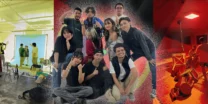FOLLOWING claims that a student used artificial intelligence (AI) tools to complete a paper for class, University of the Philippines professors said Monday that it was important to discuss the boundaries when incorporating AI tools into the academic work of both students and faculty members.
The allegation on AI use for a class requirement came from a professor who said he grew suspicious when the students’ written work failed to make sense. He also inputted the essay into an AI detector and said the results indicated that the work was “most likely written by AI.”
This incident came amid the growing popularity of ChatGPT, an AI large language model chatbot that provides human-like conversations and composes answers to questions based on the massive information it gathers online.
Recently, the UP Artificial Intelligence Program condemned the use of AI tools that misrepresent “valid scholarly works” and called on the students to maintain academic integrity by ensuring that all academic requirements should be solely done by students.
But it also said use of AI tools to enhance and facilitate the students’ learning “should be encouraged.”
In a forum on Monday, UP Diliman’s Vice Chancellor for Academic Affairs Dr. Tess Payongayong said it was important that students have access to artificial intelligence tools, not only to ChatGPT but other AI systems, in order to improve their output inside the academic setting.
But Payongayong stressed that these AI tools should not replace the actual work done by students.
“We [need to] rethink our assessment tools and mahalaga na when we discuss this with students, we tell them to use AI technologies to improve their work, hindi para gawin yung trabaho para sa kanila,” Payongayong said.
She noted that faculty members have yet to define the boundaries to determine to what extent students and teachers should incorporate AI-generated suggestions in their academic outputs.
Ethical implications
But she also said that even though AI helps students refine their work, there are ethical implications that may emerge, depending on how they use this new technology.
Questions about ethical concerns may surface if students take full ownership of outputs created by chatbots “without giving credit to where credit is due,” she said.
But if students only use chatbots for light assistance in completing their requirements, these AI systems become a “helpful tool” for them.
“If we use ChatGPT to improve our work, if we ask it to remove grammatical errors or any other light assists and it will not be tantamount to doing your work, then it simply becomes a simple tool to help us,” she said.
Recommendations
The use of AI tools should be viewed as a learning opportunity for students to practice their comprehension skills, according to Dr. Ramon Guillermo, Professor of UP Diliman Center for International Studies.
Faculty members should also train students on interpreting data and encourage them to practice creativity and critical thinking, since AI tools cannot make interpretations on their own, Guillermo said.
“What we have to do is bring in the interpretative framework, train them to interpret, that’s the objective of education because this kind of model (ChatGPT) cannot actually interpret, it looks at interpretations, summarizes interpretations. Siguro ito yun isa sa mga aspects na pwede nating i-explore,” he said.
Faculty members using AI
Aside from students, professors are also warned to be careful about the use of AI tools as they can also be prone to the negative impacts of artificial intelligence on academic integrity.
This concern arose after various foreign professors listed ChatGPT as their co-author in their dissertations.
UP officials urged professors not to become dependent on using chatbots when writing their research manuscripts to avoid misleading content.
They also advised professors to continue fact-checking and verifying information provided by ChatGPT if using artificial intelligence-powered tools cannot be avoided.
“We should not be over-reliant on this, to be 100 percent dependable on these systems because these systems might also provide misleading information. Nagpoprovide din siya ng thought process na hindi naman tama, it’s not 100 percent foolproof,” said UP Diliman Artificial Intelligence Program Coordinator Dr. Rex Jalao.









